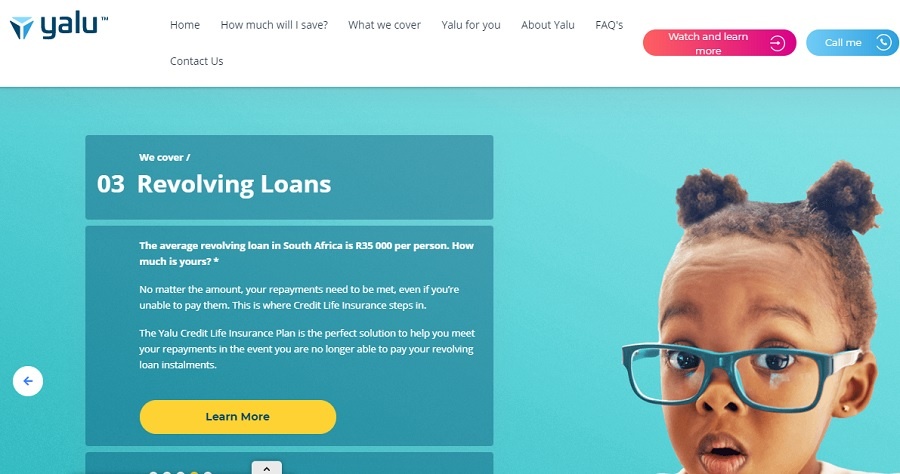As South Africans brace themselves for the economic impact of the coronavirus pandemic, it may be worth noting that an insurtech startup is offering transparent access to credit life insurance.
Provided by the Johannesburg-based Yalu and underwritten by Old Mutual Alternative Risk Transfer (OMART), credit life insurance pays for a consumer’s debt should they no longer be able to pay due to retrenchment, disability, or even death.
In the South African market, credit providers usually insist that consumers have this cover for the duration of their loans, particularly for personal and student loans and in some instances for credit cards, home and vehicle loans.
“Up until now this type of insurance has primarily been sold as part of the credit facility. As a result, most consumers are not aware that they have also taken up credit life insurance at this point and therefore never really know – how much it costs them; that they can choose to take this cover elsewhere; or when and how they can claim for it should they need to,” Yalu’s co-founder Tlalane Ntuli told Disrupt Africa.
“Yalu offers the Yalu Credit Life Insurance Plan which offers consumers an alternative credit life insurance solution to what they get from their bank or credit provider. The plan covers unsecured debt provided by banks specifically personal loans, student loans, revolving loans and credit cards. We’re looking to launch cover for home and vehicle loans in the first half of 2020.”
All of note in a market where the economic impact of the pandemic is likely to hit in a big way. Yalu claims its affordability and simplicity makes it stand out from its competitors, while it also offers customers 10 per cent of the premiums they have paid back at the end of the loan. Meanwhile, one policy covers multiple credit facilities.
Founded in late-2017 by Ntuli alongside Nkazi Sokhulu, both formerly executives at FNB Life, Yalu was launched after the pair identified an opportunity to disrupt an industry that had made huge profits at the expense of consumers for a very long time. It started operating in 2018.
“The key focus areas before Yalu was launched into the market, were on obtaining the correct regulatory requirements to become a financial services provider, securing the right partners, specifically for IT, underwriting and reinsurance. Importantly we had to develop a business model we believed could help scale Yalu and ensure its sustainability,” Ntuli said.
To do this, Yalu leveraged off the co-founders’ experience in building, selling and servicing credit life insurance products in big banks, and created a best in class product and technology platform.
“We had a clear understanding that the banks – our main competitors – had the first-in advantage with the consumer, as they secure the consumer at their most vulnerable – when they are applying for credit,” she said.
“As a result, the Yalu take-up process needed to be seamless and easy for the consumer as any hindrances would discourage them from considering the Yalu Plan. This is why our online take-up process takes less than five minutes on our website.”
The tech encourages uptake, then, but in reality it is the product that stands out. In South Africa, formal lending institutions such as banks typically require the borrowing consumer to have credit life insurance on certain products for the duration of the loan term. While South African regulation allows for the consumer to choose their own credit life insurance provider, in practice, consumers end up with their credit provider’s credit life insurance product when the debt is granted. This is due to a lack of awareness of the product and the lack of freedom for them to choose their own credit life insurance provider at point-of-sale.
“This lack of awareness has also led to many consumers not claiming from their policies when the need arises,” Ntuli said.
“As mentioned, credit life insurance pays the consumer’s outstanding debt should they die, become disabled or get retrenched. Credit life insurance revenues are ZAR20 billion (US$1.5 billion) annually, and coupled with an approximately 20 per cent claims ratio, makes it the most profitable form of long-term insurance on a premium-cover ratio.”
Yalu is currently the only standalone credit life insurance provider in South Africa which covers multiple unsecured credit facilities from multiple credit providers under one policy. The company mainly competes with the credit providers themselves.
“We’re also the only player in the market that takes over the heavy administration of cancelling existing credit life insurance policies for consumers – making it even easier for the consumer to switch their policies to the Yalu Credit Life Insurance Plan. Not only do we do this, but we don’t debit our consumers until we’ve received cancellation confirmation from their credit life insurance providers,” said Ntuli.
All of this means Yalu has attracted much attention. The startup has secured funding and plans to raise a Series A round in 2020. It was also one of eight recipients of the 2019 AlphaCode Fintech Startup Awards. Most importantly, customers like it.
“The consumer market has been very receptive to Yalu as a disruptor in the Credit Life Insurance space. We’ve been able to increase our customer base by ten times in less than a year and have been able to increase insurance premium collections by over 15 times in the same period. This is testament of the value our team brings to the business and that consumers appreciate the right to choose and show us by trusting us,” said Ntuli.
Insurance is a highly regulated industry in most markets, and as a result Yalu’s focus has for now only been on South Africa.
“We are certainly considering other African markets but take cognisance of the fact that such expansion would require local expertise in each market particularly from a legislative perspective,” she said.


